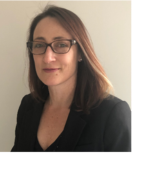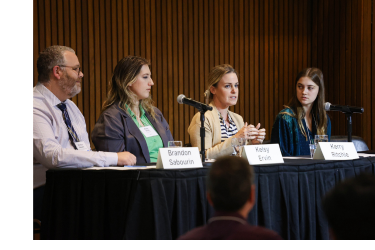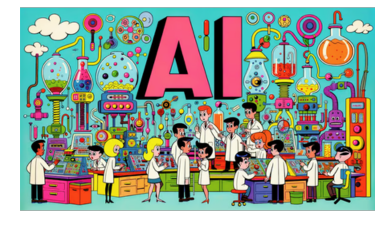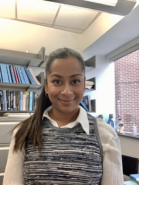The emergence of generative artificial intelligence (genAI) put higher education on alert this past year. It is clear that the technology has transformative potential in teaching and learning. Let’s have a look at what happened this past year and how we, at OTL, worked to learn, assess, and help our UofG teaching and learning community adapt to genAI.
This collective effort represents a campus-wide collaboration, and our gratitude extends to the dedicated faculty, instructors, staff, and students who have joined forces with us to navigate the opportunities and challenges presented by genAI in teaching and learning. Their invaluable partnership has significantly contributed to our progress. We are committed to ongoing consultations with faculty, seeking insights into their experiences and strategies for seamlessly integrating AI.

Early Investigations
| November 30, 2022: |
 The company OpenAI publicly releases ChatGPT 3.5, a free-to-use large language model artificial intelligence chatbot that generates clear, thorough responses to users’ textual prompts. ChatGPT becomes an overnight success as the fastest-growing consumer application up to that time, gaining 100 million users within two months of its release. Many other generative artificial intelligence tools gain attention from ChatGPT’s success, including those that generate other forms of media, such as still and moving images (Dall-E, Runway), and sound, voice, and music. With this release, people raise serious concerns about how generative AI replicates human biases, discrimination, and misinformation given that the chatbots are trained on human-created information. The company OpenAI publicly releases ChatGPT 3.5, a free-to-use large language model artificial intelligence chatbot that generates clear, thorough responses to users’ textual prompts. ChatGPT becomes an overnight success as the fastest-growing consumer application up to that time, gaining 100 million users within two months of its release. Many other generative artificial intelligence tools gain attention from ChatGPT’s success, including those that generate other forms of media, such as still and moving images (Dall-E, Runway), and sound, voice, and music. With this release, people raise serious concerns about how generative AI replicates human biases, discrimination, and misinformation given that the chatbots are trained on human-created information.
|
| December 2022: |
 On Dec. 8-9, ChatGPT features prominently among conversations at McMaster University’s Innovations in Education conference, including a presentation by digital pedagogy expert Christa Morrison, pictured to the left, co-presented with student collaborators on the promising capabilities of AI in higher education. OTL’s Christopher Laursen connects with Christa to discuss the technology, and begins tracking and annotating articles and media on the rise of ChatGPT in relation to post-secondary education. On Dec. 8-9, ChatGPT features prominently among conversations at McMaster University’s Innovations in Education conference, including a presentation by digital pedagogy expert Christa Morrison, pictured to the left, co-presented with student collaborators on the promising capabilities of AI in higher education. OTL’s Christopher Laursen connects with Christa to discuss the technology, and begins tracking and annotating articles and media on the rise of ChatGPT in relation to post-secondary education.
|
| January 2023: |
- Community college writing teacher Anna Mills invites educators from around the world to begin sharing resources about genAI in an English-language Google Doc to pool knowledge and support. This is a relief as it’s nearly impossible for any one person to keep track of all of the information. A few centres for teaching and learning at post-secondary institutions respond with early guidance by publishing answers to frequently asked questions about genAI on their websites. OTL drafts initial recommendations around academic integrity for UofG adminstration considering the quick growth of genAI.
|
| February 2023: |
- Post-secondary educators increasingly share what they know about genAI technologies through presentations to spread understanding amidst concerns raised about how ChatGPT’s capabilities challenge traditional assessments, particularly essay writing.
|
| March through April 2023: |
- March starts with the University of Guelph’s statement on artificial intelligence systems, ChatGPT, and academic integrity, the first step in clarifying student and instructor responsibilities in using genAI in academic work. This includes emphasizing OTL’s resources on fostering academic integrity. Media coverage and critical examinations of the technology continue to flag risks around potential academic misconduct and the effect genAI may have on teaching and learning. With this, there are growing resources at some post-secondary institutions, but most educational developers are still in the process of understanding the technology and how it affects teaching and learning. There are also cautiously optimistic evaluations of how AI will potentially enhance the quality of higher education. In March, Anna Mills presents to Lang School of Business on how to teach writing in the age of AI text generators. In April, the CSAHS Hub for Teaching and Learning Excellence posts a hybrid panel featuring UofG instructors offering their perspectives on genAI.
|

Enacting Guidance
| May 2023: |
- In early May, the MacPherson Institute invites pedagogical experts from centres for teaching and learning from Ontario colleges and universities to gather to better understand genAI, its impacts on teaching and learning, and the types of guidelines that might be created to help instructors navigate the technology. OTL’s Christopher Laursen, Jenn Reniers, and Janet Wolstenholme participate and gain excellent initial insights on next steps to guide UofG’s instructors. More critical analyses of the social, economic, and environmental impacts of AI emerge to demonstrate significant issues around equity and sustainability.
- Integrated Biology assistant professor Tim Bartley gives an overview of ChatGPT and how it can be integrated into courses at COESP Day on May 9th.
 At the 2023 Teaching and Learning Innovations conference (May 17-18), OTL organizes two panels to explore the rise of genAI, the first featuring leading and emerging thinkers on AI, Kevin Matsui (CARE-AI), Graham Taylor (CARE-AI, Computer Engineering), Jacob Claessens ( MEng student and co-developer of AI-powered snap-text-to-speech app Oriole), and Christa Morrison (McMaster University). The second panel, pictured to the right, has students Carson Johnston (Philosophy undergraduate) and Kelsy Erving (Psychology PhD candidate) along with Kerry Ritchie (Human Health and Nutritional Sciences, Director of COESP) and Brandon Sabourin (OTL) reflect on what genAI potentially means for assessments. There are also some posters and presentations on AI in education, including Mary McCaffery and Christopher Laursen introducing the tool they co-developed - a tool that could help instructors determine allowable and non-allowable uses of genAI with writing assignments. At the 2023 Teaching and Learning Innovations conference (May 17-18), OTL organizes two panels to explore the rise of genAI, the first featuring leading and emerging thinkers on AI, Kevin Matsui (CARE-AI), Graham Taylor (CARE-AI, Computer Engineering), Jacob Claessens ( MEng student and co-developer of AI-powered snap-text-to-speech app Oriole), and Christa Morrison (McMaster University). The second panel, pictured to the right, has students Carson Johnston (Philosophy undergraduate) and Kelsy Erving (Psychology PhD candidate) along with Kerry Ritchie (Human Health and Nutritional Sciences, Director of COESP) and Brandon Sabourin (OTL) reflect on what genAI potentially means for assessments. There are also some posters and presentations on AI in education, including Mary McCaffery and Christopher Laursen introducing the tool they co-developed - a tool that could help instructors determine allowable and non-allowable uses of genAI with writing assignments.
|
| June and July 2023: |
- Having quickly struck up a task force with representation from its faculties, students, and academic leaders, the MacPherson Institute at McMaster publishes provisional guidelines on instructors’ use of genAI in teaching and learning.
- In consultation with the MacPherson Institute, the OTL team evaluates McMaster’s guidelines, reworks them for the University of Guelph, and drafts recommendations for review by the Teaching and Learning Network, an initiative chaired by OTL that emerged from the Provost’s Task Force on Pedagogical Innovation. With representation from faculty at each of the UofG’s Colleges, students, as well as other academic units, input quickly generates our own set of Provisional Recommendations for the use of genAI in teaching and learning. OTL publishes an AI-themed newsletter including our emergent resources and tools, and an overview of activities and ideas to date.
- Also from the Provost’s Task Force, the inaugural University Teaching Leadership Fellows begin three-year pedagogical research projects, including Dr. Matthew LaGrone, Program Head of Liberal Studies at the University of Guelph-Humber, who launches research into the capabilities of genAI in post-secondary assessments. Matthew builds a new AI Literacy Lab in collaboration with student researchers and actively collaborates with OTL to practically consider issues around AI in teaching and learning.
|
| August 2023: |
- OTL leads an online summer session to enable UofG instructors to share more about their experiences, learn more about ChatGPT and generative AI, and to get an overview on the tool to help them consider allowable or non-allowable uses of genAI in their courses. After participating in the session, most instructors reported feeling more informed and encouraged to experiment with genAI.
- After further review and refinement, OTL launches provisional recommendations for the use of generative AI in teaching and learning at the University of Guelph. The eight recommendations help instructors navigate how to potentially use genAI when planning and designing their courses along with incorporating genAI into courses for student use. The recommendations bring attention to the importance of gaining AI literacy, intentionally using genAI in relation to learning outcomes, communicating with students on genAI use and issues, fostering academic integrity, and being aware of the risks and opportunities associated with the technology.
- Associate Professor Kerry Ritchie and OTL’s Aron Fazekas are awarded a Scholarship of Teaching and Learning (SoTL) Grant to investigate instructor and student values of plain language writing competencies in the era of generative AI.
|

Observing and Sharing
| October 2023 |
 Matthew LaGrone’s AI Literary Lab launches its first newsletter filled with experimentations and analyses of generative AI’s capabilities, including around generating other forms of media, such as visuals. The AI Literacy Lab leads a variety of hybrid seminars through the Fall semester to share experiences around genAI in teaching and learning. Matthew LaGrone’s AI Literary Lab launches its first newsletter filled with experimentations and analyses of generative AI’s capabilities, including around generating other forms of media, such as visuals. The AI Literacy Lab leads a variety of hybrid seminars through the Fall semester to share experiences around genAI in teaching and learning.
|
| November 2023 |
 OTL participates in the University of Guelph Retirees’ Association Fall Forum at the Arboretum, where Philosophy associate professor Gus Skorburg introduces his approach to AI ethics, OTL’s Christopher Laursen gives an overview of how we addressed genAI, and Integrated Biology assistant professor Tim Bartley shares how he incorporates genAI into his courses. The retirees comment on how they entered the topic feeling anxious, but feel more optimistic and curious about the technology’s uses in higher education. OTL participates in the University of Guelph Retirees’ Association Fall Forum at the Arboretum, where Philosophy associate professor Gus Skorburg introduces his approach to AI ethics, OTL’s Christopher Laursen gives an overview of how we addressed genAI, and Integrated Biology assistant professor Tim Bartley shares how he incorporates genAI into his courses. The retirees comment on how they entered the topic feeling anxious, but feel more optimistic and curious about the technology’s uses in higher education.- OTL co-organizes a virtual Fireside Chat on genAI with CARE-AI, featuring Gus, Tim, Matthew LaGrone, and Molecular and Cellular Biology instructor Marissa Dahari, pictured to the right, to show how they have incorporated genAI into their teaching since the release of ChatGPT 3.5. Overall, they report student enthusiasm around using the technology as part of learning.
|
| December 2023: |
- Coming full circle from where we began, OTL’s Brandon Sabourin organizes a panel for McMaster’s Innovations in Education Conference featuring his OTL colleague Christopher Laursen alongside Shannon Bramwell (Professor, Learning and Teaching, Centre for Faculty Development and Teaching Innovation, Centennial College) and two former UofG Educational Developers, Erin Aspenleider (Associate Director, Central Programming, MacPherson Institute for Leadership, Innovation and Excellence in Teaching, McMaster University) and Tommy Mayberry (Director, Centre for Teaching Excellence and Innovation, Toronto Film School and Yorkville University). The panelists share and compare how they lead initiatives to address the rise of genAI in higher education.
- Also at Innovations in Education, Christopher co-presents with Mary McCaffery on the tool to help instructors determine allowable uses of genAI presenting some initial feedback on the tool’s uses by UofG faculty. Feedback indicated how important it is for instructors to demonstrate genAI in relation to how it could be used by students as part of assessments. The instructors emphasized the value of how the tool enables them to reflect on and clearly communicate responsible, appropriate, allowable and non-allowable uses of genAI.
|

What's Next
 With rapidly advancing technical capabilities and concerns over ethics and responsible development, headlines about artificial intelligence have not subsided over the past year, and uncertainty about where it’s going remains. Artificial intelligence is becoming as central a technology to teaching and learning as computers and the internet have been. OTL will be reviewing and updating provisional recommendations for instructors and considering genAI’s uses as assistive technology in teaching and learning. This work will continue to include collaborations across our campus and with other post-secondary institutions.
With rapidly advancing technical capabilities and concerns over ethics and responsible development, headlines about artificial intelligence have not subsided over the past year, and uncertainty about where it’s going remains. Artificial intelligence is becoming as central a technology to teaching and learning as computers and the internet have been. OTL will be reviewing and updating provisional recommendations for instructors and considering genAI’s uses as assistive technology in teaching and learning. This work will continue to include collaborations across our campus and with other post-secondary institutions.
 With rapidly advancing technical capabilities and concerns over ethics and responsible development, headlines about artificial intelligence have not subsided over the past year, and uncertainty about where it’s going remains. Artificial intelligence is becoming as central a technology to teaching and learning as computers and the internet have been. OTL will be reviewing and updating provisional recommendations for instructors and considering genAI’s uses as assistive technology in teaching and learning. This work will continue to include collaborations across our campus and with other post-secondary institutions.
With rapidly advancing technical capabilities and concerns over ethics and responsible development, headlines about artificial intelligence have not subsided over the past year, and uncertainty about where it’s going remains. Artificial intelligence is becoming as central a technology to teaching and learning as computers and the internet have been. OTL will be reviewing and updating provisional recommendations for instructors and considering genAI’s uses as assistive technology in teaching and learning. This work will continue to include collaborations across our campus and with other post-secondary institutions. 







